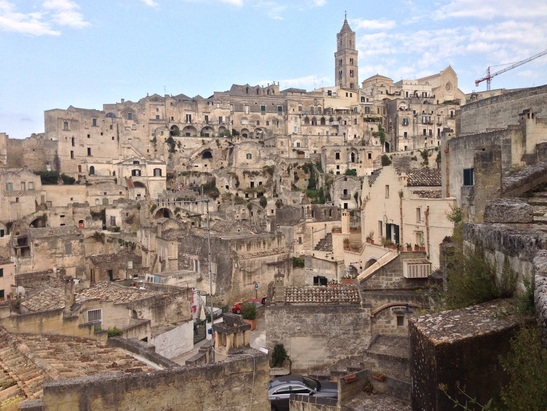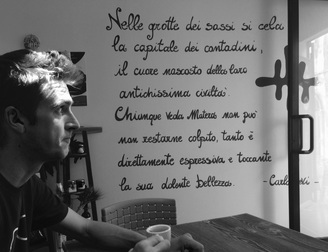|
“So expressive and touching is its sorrowful beauty.” The words of Carlo Levi offer a perspective into the reality of the world around us. He was writing about a place, and an experience that left him awe-struck; the people and caves of Matera in Italy. Carlo Levi’s life was punctuated and reshaped by the Second World War. He grew up in Northern Italy, where he practiced medicine and painting. He also practiced anti-fascist political activism. This was unpopular, and resulted in his banishment to a small and poor town in the south of Italy. He found a world of poverty and suffering, and whole communities of people who had been forgotten by a rapidly changing Europe. Carlo wrote of his observations of impoverished Southern Italy in his book called Cristo si é formato a Eboli: Christ stopped at Eboli. The assertion found in the title of the work is that everything to the south of the city of Eboli, near Napoli, existed in darkness. Primitive and pagan, the people who lived buried in the south of Italy, felt themselves to be left behind by Christianity and contemporary morality, and were no longer included in the story of humanity. In the cave homes of Matera, 200 kilometres beyond Eboli, Carlo Levi observed significant poverty. He found people living in homes carved directly into the rock of the valley; single rooms shared by children, livestock, mothers and fathers. Whole families living in dark caves, lit only through rough-cut openings, with dirt floors and damp roofs, and no sign of running water or electricity. This was happening in the middle of the 20th century, and the contrast to life in the majority of Northern Italy and Western Europe was significant. The caves of Matera - The Sassi - are piled one on top of the other and form a primitive and spectacular living environment. The conditions for the people who scratched out their life there caused an outrage and came to stand as a symbol of the inequality and injustice that existed within Italy. Carlo Levi’s writing maintains genuine importance to the people of Matera still. This quotation seems to capture something significant: “In the Sassi caves is concealed the capitol of the peasants, its heart hidden in their ancient civilisation. Anyone who sees Matera cannot help but be awe struck, so expressive and touching is its sorrowful beauty.” The human suffering present in Matera was wrapped up tightly with the unique magnificence of the Sassi caves. It is a fantastical hidden corner of our world, with secret winding streets and towering caves, built and stacked high on the steep sides of the valley. Churches, homes and businesses all tangle together to form a unique synergy between the natural, and the human made. Carlo Levi was awe-struck by the beauty he observed, that such a unique and hidden location, which was permeated with poverty and suffering, could be so expressive and touching. One potential interpretation of Levi’s observation is that the peasants living out their ancient civilisation in the caves of the Sassi didn’t reduce the beauty of the place. Perhaps, even, the awe-striking nature of Matera was directly related to the sorrowful living conditions of the people at the time.
It may be possible to extend that interpretation of beauty to other human experiences: our experiences today. It is clear that the moments of unique magnificence, which we all experience in life, certainly contain beauty and value. Powerfully though, and less intuitively, it may be possible to be awe-struck by the moments in our life that are painful and touched with sorrow or disappointment. Perhaps with awareness and practice there is an avenue to find the beauty in all the elements of our lives, even those that are tinged with difficulty. Certainly there seems to be value and hope in the possibility. Watching for the beauty that exists within the regular moments of the day may well seem a task of overly energetic optimism. There is, however, a reality to be considered; beauty and significance exist in more than just the enjoyable and delightful moments of life. It is possible to be awe-struck by events or experiences that are something other than wonderful. Perhaps Carlo Levi perceived something similar during his time exiled amongst the impoverished. If there is value and beauty to be experienced in a range of different moments, then the opportunity is clear. Each of us can look again at the pieces of our lives, and if we do, there is a chance of being awe-struck at the hidden heart we may well find.
0 Comments
Leave a Reply. |
AuthorHigh school teacher Archives
September 2023
CategoriesThemes |



 RSS Feed
RSS Feed
